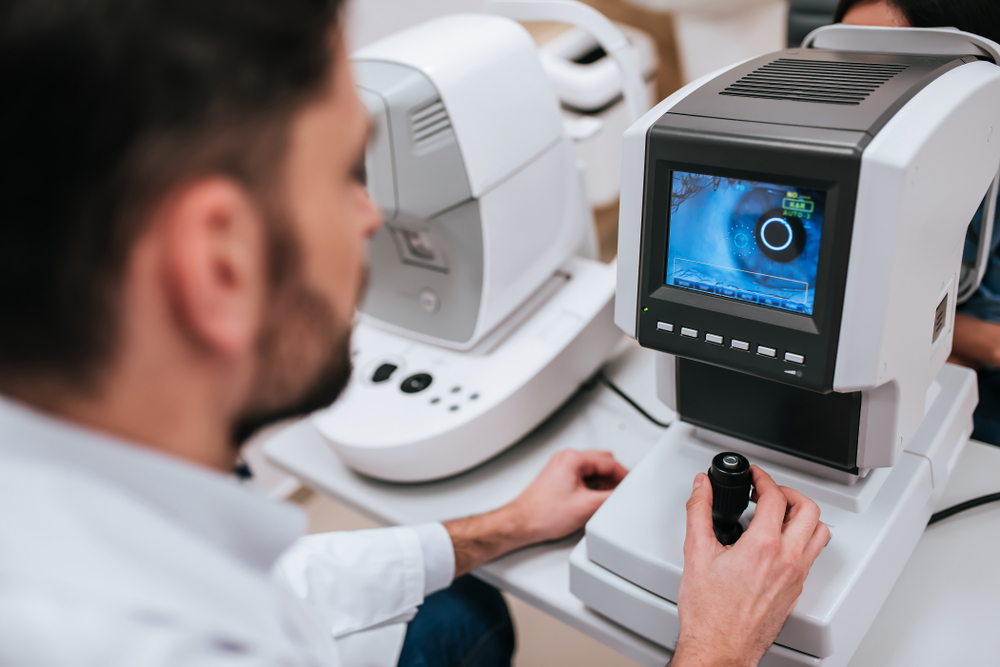Neuro-Ophthalmology
Kevin Sitko, MD
Medical School
University of North Carolina at Chapel Hill
Fellowship
Neuro-Ophthalmology
Emory University School of Medicine
Internship
Internal Medicine
Cone Health
Residency
Ophthalmology
Tufts Medical Center
Certification
American Board of Ophthalmology
What is a Neuro-Ophthalmologist?

Neuro-ophthalmologists take care of visual problems that are related to the nervous system; that is, visual problems that do not come from the eyes themselves. We use almost half of the brain for vision-related activities, including sight and moving the eyes. Neuro-ophthalmology, a subspecialty of both neurology and ophthalmology, requires specialized training and expertise in problems of the eye, brain, nerves, and muscles.
Neuro-ophthalmologists complete at least 5 years of clinical training after medical school and are usually board-certified in Neurology, Ophthalmology, or both. Although some problems seen by neuro-ophthalmologists are not worrisome, other conditions can worsen and cause permanent visual loss, or become life-threatening. Sometimes the problem is confined to the optic nerve or the nervous system and other times it is related to a general medical condition. Neuro-ophthalmologists have unique abilities to evaluate patients from the neurologic, ophthalmologic, and medical standpoints to diagnose and treat a wide variety of problems. Costly medical testing is often avoided by seeing a neuro-ophthalmologist.
Many neuro-ophthalmic disorders encompass a wide range of problems including unexplained visual loss, hereditary retinal dystrophies, optic nerve, and chiasmal lesions, brain tumor, stroke, double vision, nystagmus, thyroid eye disease, atypical headache, temporal arteritis, hydrocephalus, myasthenia gravis, pupillary asymmetry, and visual field defects. The examination is augmented by ancillary studies, e.g., CT and MRI.
Scheduling with the Neuro-Ophthalmologist
You must be referred by a doctor to schedule with our neuro-ophthalmologist. Our neuro-ophthalmologist may need to confer with your doctor prior to scheduling your appointment.
The neuro-ophthalmologist will need all relevant information prior to your appointment, including office notes, results of laboratory tests and reports of CT and MRI scans. If you do not have a doctor referring you please make an appointment with one of our Eye Associates of New Mexico doctors. If your condition requires a neuro-ophthalmic visit, you will be referred by our doctors.
Preparing for the Neuro-Ophthalmology Evaluation
Request that your treating physicians send all relevant information to the neuro-ophthalmologist prior to your appointment, including office notes, results of laboratory tests and reports of CT and MRI scans. If you have had a CT or MRI scan performed, arrange to pick up the actual films and bring them with you or have the facility mail them to the neuro-ophthalmologist in advance or your appointment. You will probably have your pupils dilated during the visit. The eye drops last about 4 hours and will make things look bright and blurry up close. Have someone else drive you to the appointment and bring your sunglasses.
Ladies, in order for the physician to get a good look at your eyelids, and to avoid ruining your appearance when the eye drops are administered, do not wear eye makeup. Bring a complete list of medications with you, including the name and dosage of prescription and over-the-counter medications.
What happens during the evaluation?
The neuro-ophthalmologic evaluation is one of the most comprehensive examinations you will experience. It may take a few hours to complete. You will be asked to give an account of your current problem and relate your entire medical history, including previous hospitalizations, operations, serious illnesses, medical problems in your family members, and medication allergies.
You will have a complete eye examination. This may include testing of your peripheral vision (visual field test). You may have a partial or complete neurologic exam to test your strength, sensation, and coordination. The neuro-ophthalmologist will review the records and scans from previous evaluations, if applicable.
After the examination, the neuro-ophthalmologist will discuss the diagnosis (or possible diagnoses), the need for any additional testing and possible treatment.
